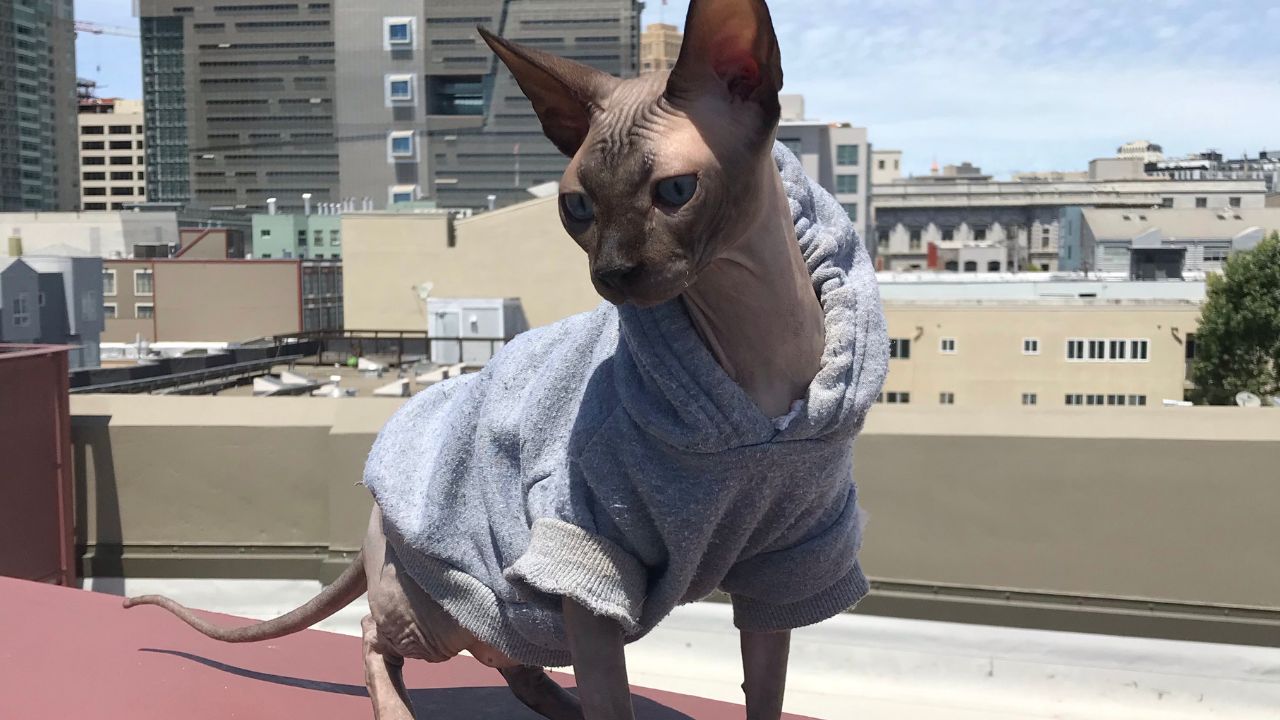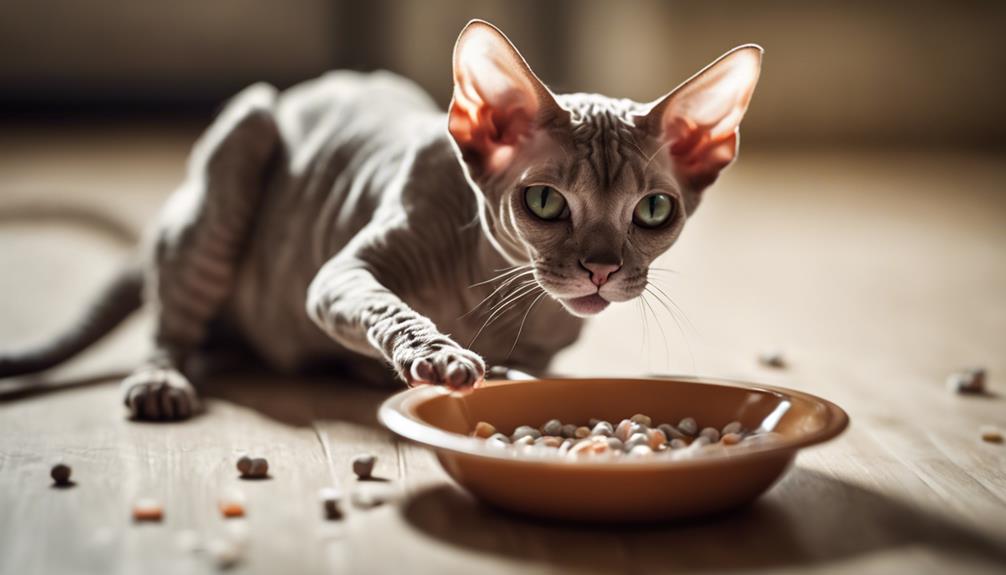Sphynx cats are known for their unique appearance, but they also have some unique behavior traits that can cause problems for their owners. From litter box issues to excessive meowing, Sphynx cat behavior problems can be frustrating and difficult to deal with.
One of the most common Sphynx cat behavior problems is avoiding litter boxes. This can be caused by a variety of factors, including boredom, irritation, depression, or illness. It’s important to make sure your Sphynx cat has access to a clean litter box and that you have enough litter boxes in your home. Additionally, you may want to try different types of litter to see what your cat prefers.
Another Sphynx cat behavior problem is excessive meowing. Sphynx cats are known for being vocal, but if your cat is meowing excessively, it could be a sign of an underlying health issue or a behavioral problem. It’s important to take your cat to the vet to rule out any health issues, and to make sure your cat is getting enough attention and stimulation.
Common Sphynx Cat Behavior Problems
Sphynx cats are a unique breed known for their lack of fur and playful personality. However, like any other cat breed, they may exhibit certain behavior problems that can be a cause for concern for their owners. In this section, we will discuss some common Sphynx cat behavior problems and how to fix them.
Aggression
One of the behavior problems that can be seen in Sphynx cats is aggression. This may be triggered by various factors such as stress, fear, or lack of socialization. Sphynx cats may become aggressive towards their owners, other pets, or strangers. To fix this behavior problem, it is important to identify the underlying cause and address it accordingly.
Excessive Vocalization
Sphynx cats are known for their vocal nature and may meow or purr excessively. This behavior problem may be caused by boredom, loneliness, or attention-seeking behavior. To fix this behavior problem, provide your Sphynx cat with plenty of interactive toys and companionship. Additionally, make sure to give them regular attention and playtime.
Destructive Scratching
Sphynx cats may also exhibit destructive scratching behavior, which can damage furniture and other household items. This behavior problem may be caused by lack of scratching posts or boredom. To fix this behavior problem, provide your Sphynx cat with plenty of scratching posts and interactive toys. Additionally, you may want to consider trimming their nails or using nail caps to prevent damage.
Other behavior problems that may be seen in Sphynx cats include separation anxiety, clinginess, and attention-seeking behavior. It is important to address these behavior problems early on to prevent them from becoming more severe. Providing your Sphynx cat with plenty of affection, exercise, and mental stimulation can go a long way in preventing behavior problems.
In addition to behavior problems, Sphynx cats may also be prone to certain health issues such as dental disease, oily skin, and obesity. It is important to provide them with a healthy diet, regular baths, and special care to prevent these health problems.
Overall, Sphynx cats make great family pets and are known for their affectionate and playful nature. However, like any other cat breed, they may exhibit certain behavior problems that require attention and care. With proper care and attention, you can help your Sphynx cat live a happy and healthy life.
How to Fix Aggression in Sphynx Cats
Sphynx cats are known for their high levels of activity, vitality, and energy. However, they can occasionally show signs of aggression, which can be frustrating for their owners. If you’re dealing with an aggressive Sphynx cat, don’t worry. There are several things you can do to help fix the problem.
Identifying the Cause of Aggression
The first step in fixing aggression in your Sphynx cat is to identify the cause of the behavior. Aggression can be caused by a variety of factors, including:
- Fear or anxiety
- Lack of socialization
- Health problems
- Environmental stressors
If you’re not sure what’s causing your cat’s aggression, it’s important to take them to the vet for a checkup. Your vet can rule out any underlying health problems that might be contributing to the behavior.
Training and Socialization
Once you’ve identified the cause of your cat’s aggression, you can start working on a solution. Training and socialization are key components of fixing aggressive behavior in cats. Here are some tips:
- Use positive reinforcement to reward good behavior and discourage bad behavior.
- Provide plenty of toys and playtime to keep your cat occupied and less likely to act out.
- Socialize your cat with other pets and people to help them feel more comfortable in different situations.
- Consider enrolling your cat in obedience training classes to help them learn good behavior.
Providing a Safe Environment
Another important factor in fixing aggression in Sphynx cats is providing a safe environment. Here are some tips:
- Create a safe space for your cat where they can retreat if they feel threatened or overwhelmed.
- Make sure your cat has plenty of food, water, and a clean litter box.
- Provide plenty of scratching posts and other toys to keep your cat entertained.
- Avoid punishing your cat for bad behavior, as this can make the problem worse.
By following these tips, you can help fix aggression in your Sphynx cat and create a happier, more sociable family pet. Remember to be patient and consistent in your training efforts, and don’t hesitate to seek professional help if needed.
How to Fix Excessive Vocalization in Sphynx Cats
Excessive vocalization in Sphynx cats can be a frustrating problem for both the cat and their owners. However, with a little patience and training, it is possible to fix this behavior. Here are some tips to help you address this issue:
Identifying the Cause of Excessive Vocalization
Before you can begin to fix the problem, you need to identify the cause of your Sphynx cat’s excessive vocalization. Some common causes include:
- Hunger or thirst
- Boredom or lack of stimulation
- Separation anxiety
- Medical issues
If you suspect a medical issue, it is important to take your cat to the vet for a check-up. Once you have ruled out any medical problems, you can begin to address the behavior.

Training and Positive Reinforcement
Training your Sphynx cat to stop excessive vocalization requires patience and consistency. Here are some tips to help you train your cat:
- Use positive reinforcement. Reward your cat when they are quiet and calm. This could be in the form of treats, praise, or playtime.
- Ignore the behavior. Do not give your cat attention when they are meowing excessively. This means not picking your cat up or punishing the behavior. Instead, wait until they are quiet to give them attention.
- Teach your cat to be quiet on command. Use a command like “quiet” or “enough” when your cat is meowing excessively. Reward them when they stop meowing.
Creating a Quiet Environment
Creating a quiet environment for your Sphynx cat can also help to reduce excessive vocalization. Here are some tips:
- Provide plenty of toys and stimulation. Sphynx cats are very active and need plenty of toys and playtime to keep them occupied.
- Make sure your cat has access to food and water at all times.
- Provide a comfortable and quiet sleeping area for your cat.
- Consider getting a companion for your Sphynx cat. They are social animals and often do better with a friend.
By following these tips, you can help your Sphynx cat to stop excessive vocalization and become a happy and quiet family pet.
How to Fix Destructive Scratching in Sphynx Cats
Sphynx cats are known for their playful and mischievous behavior, but sometimes their scratching can cause damage to our furniture and other household items. Fortunately, there are ways to curb this behavior and provide your cat with appropriate outlets for their scratching needs.
Providing Appropriate Scratching Surfaces
One of the most effective ways to prevent destructive scratching is to provide your Sphynx cat with appropriate scratching surfaces. These can include scratching posts, cardboard scratchers, and even tree-like structures that allow your cat to climb and scratch. It’s important to place these surfaces in areas where your cat spends the most time, such as near their favorite sleeping spot or in the room where you spend the most time together.
Training and Positive Reinforcement
Training your Sphynx cat to use appropriate scratching surfaces can take time and patience, but it’s worth the effort in the long run. Start by gently redirecting your cat to their scratching post or other appropriate surface whenever you catch them scratching something they shouldn’t. You can also use positive reinforcement techniques, such as offering treats or praise when your cat uses their scratching post correctly.
Using Deterrents
If your Sphynx cat continues to scratch inappropriately, there are several deterrents you can use to discourage this behavior. One option is to cover the surface of the object they are scratching with double-sided tape or aluminum foil. You can also use deterrent sprays that are designed to make surfaces unappealing to cats. Just be sure to provide your cat with plenty of appropriate scratching surfaces as well.
In addition to these strategies, it’s important to provide your Sphynx cat with plenty of companionship and attention. Boredom and anxiety can lead to destructive behavior, so make sure your cat has plenty of toys and playtime with you. With patience and persistence, you can help your Sphynx cat overcome their destructive scratching habits and become a beloved member of your family.
Other Sphynx Cat Behavior Problems
If you are a Sphynx cat owner, you might experience some behavior problems with your feline friend. Here are some common issues and how to fix them.
Litter Box Issues
One of the most prevalent Sphynx cat behavior concerns is avoiding litter boxes when they are bored, irritated, depressed, or ill. It’s most common when you first bring your Sphynx cat home, and it might signal a lack of litter boxes or the need for a cleaned litter box in their new environment. Here are some tips to solve litter box problems:
- Make sure you have enough litter boxes for your cat. The general rule is one litter box per cat, plus one extra.
- Clean the litter box frequently. Sphynx cats are clean animals, and they might avoid a dirty litter box.
- Try different types of litter. Some cats prefer clumping litter, while others prefer non-clumping litter.
- Place the litter box in a quiet and private area.
- If your cat still avoids the litter box, consult with your veterinarian to rule out any underlying health problems.
Attention-Seeking Behavior
Sphynx cats are known for their affectionate and social behavior. They love to be around their owners and might demand attention when they feel lonely or bored. Here are some tips to deal with attention-seeking behavior:
- Spend quality time with your cat every day. Play with them, groom them, or cuddle with them.
- Provide your cat with toys and scratching posts to keep them entertained.
- Ignore your cat’s attention-seeking behavior when it becomes excessive. Don’t reward bad behavior with attention.
- Consider getting another cat as a companion for your Sphynx.
Separation Anxiety
Sphynx cats are family pets and might suffer from separation anxiety when left alone for long periods. They might become destructive, vocal, or depressed. Here are some tips to help your cat cope with separation anxiety:
- Gradually get your cat used to being alone. Start with short periods and gradually increase the time.
- Provide your cat with a comfortable and safe space when you are away. Use a crate or a room with toys, a litter box, and water.
- Leave the radio or TV on to provide some background noise.
- Consider hiring a pet sitter or using a pet daycare service.
- Consult with your veterinarian if your cat’s separation anxiety is severe.
In conclusion, Sphynx cats are wonderful pets, but they might have some behavior problems. With patience, training, and love, you can help your cat overcome these issues and enjoy a happy and healthy life.
Conclusion
In conclusion, Sphynx cats are unique and lovable pets, but they can also present some behavior problems that require attention. Some of the most common issues include litter box avoidance, biting, scratching, and excessive meowing.
To prevent these problems, it is important to keep your Sphynx’s environment calm and stress-free. Make sure your cat has plenty of toys and scratching posts to keep them occupied, and provide multiple litter boxes in different locations throughout your home.
If your Sphynx is exhibiting any unusual behavior, it may be a sign that they are sick or in pain. Take your cat to the vet for a check-up to rule out any medical issues.
Remember that Sphynx cats require special care due to their lack of fur. Keep their skin clean and free of excess oil, and pay close attention to their ears and paws to prevent infections.
Overall, with proper care and attention, Sphynx cats can make wonderful and affectionate companions. If you are considering adopting a Sphynx, be prepared to provide them with the love and care they need to thrive.




